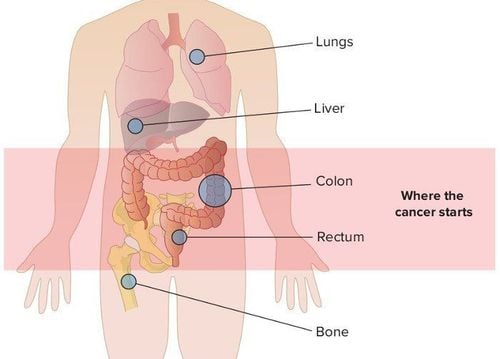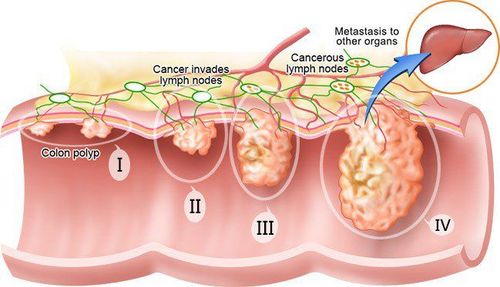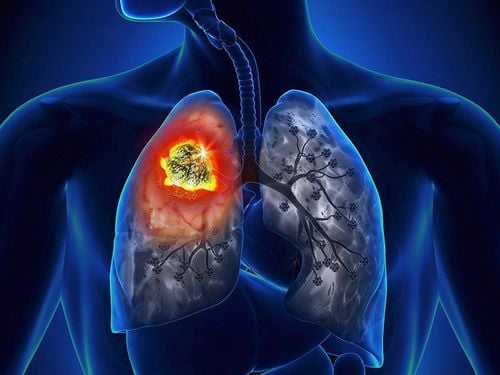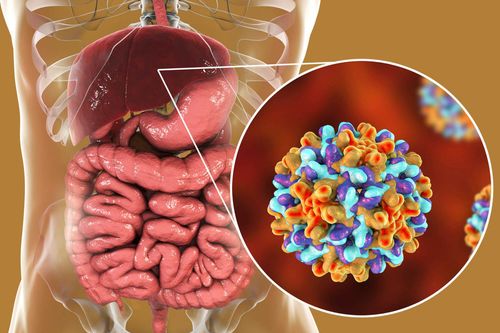This is an automatically translated article.
The article is professionally consulted by Specialist Doctor I Le Thien Quang - Internal Oncologist - Department of Medical Examination & Internal Medicine - Vinmec Danang International General Hospital. The doctor has more than 15 years of experience in the field of examination and diagnosis of oncological diseases and treatment modalities of radiation therapy, chemotherapy, targeted therapy and palliative care.Some people realize that it is very difficult to cure metastatic cancer, and they see their treatment goals as alleviating pain, improving quality of life, and dealing with side effects from cancer. or from treatment and prolong survival as long as possible.
1. What is metastatic cancer?
Metastasis is a term commonly used in medicine to describe the movement of cancer cells to other parts of the body. In general, metastatic cancer has similar characteristics and properties to primary cancer (cancer that has not metastasized, still located in the original location); However, the extent of their spread and danger is much greater.Metastatic cancer has the same root name as the primary cancer. A specific example is when liver cancer, cancer cells that spread and grow to the lungs will be called metastatic liver cancer or liver cancer that has spread to the lungs, not cancer. lung.
2. How does metastatic cancer develop?
Metastasis develops when cancer cells break away from the main tumor and enter the bloodstream, lymphatic system, or surrounding tissues. These systems carry fluid around the body. Cancer cells can move away from the original tumor and form new tumors when they settle and grow in another part of the body. Only after a few years of existence and development, the patient discovered that he had metastatic cancer.
Breast cancer tends to spread to the bones, liver, lungs, chest wall and brain Lung cancer tends to spread to the brain, bones, liver and adrenal glands prostate cancer tends to spread to the bones Colon and rectal cancer tends to spread to the liver and lungs
3. Some symptoms of metastatic cancer
In general, metastatic cancer often does not show obvious symptoms. Symptoms that occur with metastatic cancer can depend on the location and size of the tumor in the body. Below is a summary of some of the common signs and symptoms of patients with metastatic cancer:Bone metastases: causing pain or fractures Metastases in the brain: causing headaches, dizziness or convulsions Metastases in the liver: causing jaundice, fluid in the abdomen Metastases in the lungs: causing difficulty breathing or coughing up blood. Pain may be the first sign of cancer, but many patients do not have any symptoms of metastases.
4. What stage is metastatic cancer?
It can be said that determining the stage of cancer is very important, it represents an assessment of the spread of the disease. Therefore, it is considered a premise to help doctors rely on it to provide appropriate treatment for the patient as well as the patient's upcoming prognosis.A commonly used system for staging cancers is called the TNM system:
T (Tumour)- primary tumor: to indicate the size of the tumor and how far it has spread into the tissue near. T is numbered from 1 to 4, the larger the number, the larger the tumor size. N (Node)- lymph nodes: determines whether cancer has spread to nearby lymph nodes and how far. N is numbered 0-3, N0 means no lymph nodes have spread, N3 means there are many lymph nodes containing cancer cells. M (Metastasis)- metastasis: assesses whether the cancer has spread to other parts of the body. M0 is cancer that has not metastasized; M1 is metastatic cancer. Based on the combination of indicators from the TNM system, the doctor will assign each specific stage of the disease:
Stage I: is the stage that has not metastasized, there are only relatively small tumors and only contained in the organ in which it started. Stage II: The tumor has grown but has not yet begun to spread into surrounding tissues. Stage III: The cancer is larger and has begun to spread into surrounding tissues, and cancer cells are already present in nearby lymph nodes. Stage IV: The cancer has spread to other organs in the body.
5. How is metastatic cancer treated?

6. What are the treatment goals for metastatic cancer?
For many people with cancer, the goal of treatment is to try to cure the cancer, which means they want to get rid of the cancer and want it to never come back. However, to cure metastatic cancer is a very difficult thing. Because when metastatic cancer cells have grown strongly in the body, it will be difficult to control and slightly reduce their rate of spread. Treatment for metastatic cancer also depends on the patient's health status as well as the patient's medical condition (primary cancer).When you have metastatic cancer, you should determine that you will have to live with it for a long time. Doctors often treat it as a chronic illness like some other chronic conditions such as diabetes, congestive heart failure, or multiple sclerosis. It's important to follow your treatment plan to keep the metastatic cancer under control as best as possible.
Please dial HOTLINE for more information or register for an appointment HERE. Download MyVinmec app to make appointments faster and to manage your bookings easily.
Article referenced source: Cancer.net













